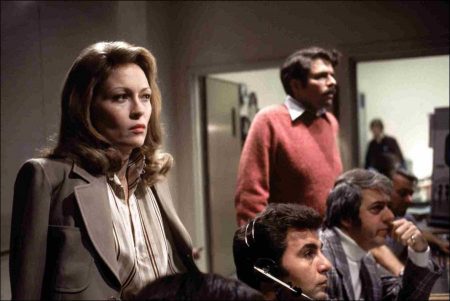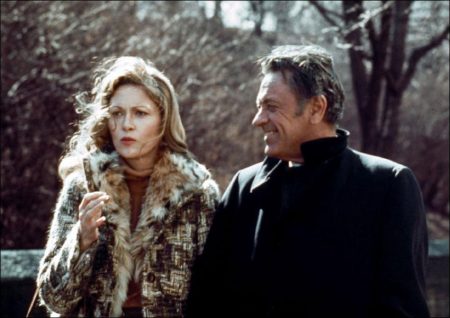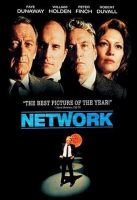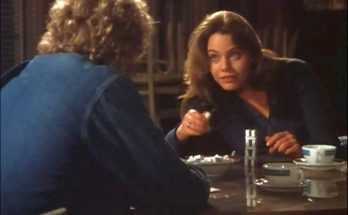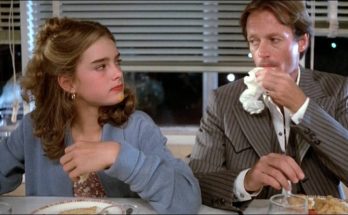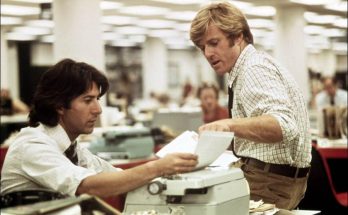Taglines: Television will never be the same!
Network movie storyline. In the 1970s, terrorist violence is the stuff of networks’ nightly news programming and the corporate structure of the UBS Television Network is changing. Meanwhile, Howard Beale, the aging UBS news anchor, has lost his once strong ratings share and so the network fires him. Beale reacts in an unexpected way. We then see how this affects the fortunes of Beale, his coworkers (Max Schumacher and Diana Christensen), and the network.
Network is a 1976 American satirical black comedy-drama film written by Paddy Chayefsky and directed by Sidney Lumet, about a fictional television network, UBS, and its struggle with poor ratings. The film stars Faye Dunaway, William Holden, Peter Finch, and Robert Duvall and features Wesley Addy, Ned Beatty, and Beatrice Straight.
The film won four Academy Awards, in the categories of Best Actor (Peter Finch), Best Actress (Faye Dunaway), Best Supporting Actress (Straight), and Best Original Screenplay (Paddy Chayefsky).
In 2000, the film was selected for preservation in the United States National Film Registry by the Library of Congress as being “culturally, historically, or aesthetically significant”. In 2002, it was inducted into the Producers Guild of America Hall of Fame as a film that has “set an enduring standard for U.S. American entertainment”.
In 2006, the two Writers Guilds of America voted Chayefsky’s script one of the 10 greatest screenplays in the history of cinema. In 2007, the film was 64th among the 100 greatest American films as chosen by the American Film Institute, a ranking slightly higher than the one AFI had given it ten years earlier.
About the Story
Howard Beale, the longtime anchor of the Union Broadcasting System’s UBS Evening News, learns from the news division president, Max Schumacher, that he has just two more weeks on the air because of declining ratings. The two old friends get drunk and lament the state of their industry. The following night, Beale announces on live television that he will commit suicide on next Tuesday’s broadcast. UBS fires him after this incident, but Schumacher intervenes so that Beale can have a dignified farewell.
Beale promises he will apologize for his outburst, but once on the air, he launches back into a rant claiming that life is “bullshit”. Beale’s outburst causes the newscast’s ratings to spike, and much to Schumacher’s dismay, the upper echelons of UBS decide to exploit Beale’s antics rather than pull him off the air. In one impassioned diatribe, Beale galvanizes the nation, persuading his viewers to shout out of their windows “I’m as mad as hell, and I’m not going to take this anymore!”
Diana Christensen heads the network’s programming department; seeking just one hit show, she cuts a deal with a band of radical terrorists (a parody of the Symbionese Liberation Army called the “Ecumenical Liberation Army”[citation needed]) for a new docudrama series called The Mao Tse-Tung Hour for the upcoming fall season. When Beale’s ratings seem to have topped out, Christensen approaches Schumacher and offers to help him “develop” the news show. He says no to the professional offer, but not to the personal one, and the two begin an affair.
When Schumacher decides to end Beale as the “Angry Man” format, Christensen convinces her boss, Frank Hackett, to slot the evening news show under the entertainment division so she can develop it. Hackett agrees, bullying the UBS executives to consent and firing Schumacher. Soon afterward, Beale is hosting a new program called The Howard Beale Show, top-billed as “the mad prophet of the airwaves”. Ultimately, the show becomes the most highly rated program on television, and Beale finds new celebrity preaching his angry message in front of a live studio audience that, on cue, chants Beale’s signature catchphrase en masse: “We’re as mad as hell, and we’re not going to take this anymore.”
At first, Max and Diana’s romance withers as the show flourishes, but in the flush of high ratings, the two ultimately find their way back together, and Schumacher leaves his wife of over 25 years for Christensen. But Christensen’s fanatical devotion to her job and emotional emptiness ultimately drive Max back to try returning to his wife, even though he doesn’t think she’ll agree, and he warns his former lover that she will self-destruct at the pace she is running with her career. “You are television incarnate, Diana,” he tells her, “indifferent to suffering, insensitive to joy. All of life is reduced to the common rubble of banality.”
Network (1976)
Directed by: Sidney Lumet
Starring: Faye Dunaway, William Holden, Peter Finch, Robert Duvall, Ned Beatty, Wesley Addy, Kathy Cronkite, Conchata Ferrell, Cindy Grover
Screenplay by: Paddy Chayefsky
Production Design by: Philip Rosenberg
Cinematography by: Owen Roizman
Film Editing by: Alan Heim
Costume Design by: Theoni V. Aldredge
Set Decoration by: Edward Stewart
Music by: Elliot Lawrence
Distributed by Metro-Goldwyn-Mayer
Release Date: November 27, 1976
Views: 170
